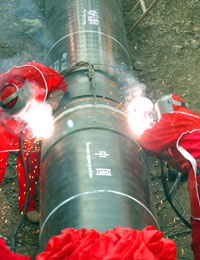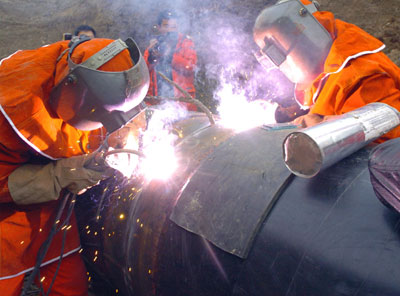|
Oil pipeline linking China, Kazakhstan joins together
(Xinhua)
Updated: 2005-11-15 06:43 As technicians of Sinopec finished their last
welding work in Alataw Pass Monday, the oil pipeline linking China and
Kazakhstan joined ends after 18 months unremitting efforts.

Technicians do the welding after connecting
the oil pipeline linking China and Kazakhstan in the Alataw Pass Monday
November 14, 2005. [Xinhua] | This marked a
perfect accomplishment of the first period of the 1000-km oil pipeline project.
The joining serves as a firm foundation for the eventual overall completion of
this project soon.
The first transnational oil project between China and Kazakhstan is jointly
built by China National Petroleum Corporation (CNPC) and its Kazakh counterpart.
In the first period of the project, 700 million US dollars was invested to
build a 813-millimeter pipeline with an oil transfusion capacity of 20 million
tons yearly.
More than 200 officials and delegates from the CNPC, the Kazakhstan National
Petroleum and Natural Gas Company, the Sino-Kazakh Oil Pipeline Co. Ltd and the
local government attendeda joining ceremony.
Kairgeldy Kabyldin, vice president of Kazakhstan National Petroleum and
Natural Gas Company, said the oil pipeline butt joint is a good example of close
cooperation between the two nations.
The construction of the transnational oil pipeline signifies that the energy
cooperation between China and Kazakhstan has stepped into a new phase, said Yin
Juntai, deputy general-manager of China Petroleum Exploration and Development
Company.

Technicians do the
welding after connecting the oil pipeline linking China and Kazakhstan in
the Alataw Pass Monday November 14, 2005.
[Xinhua] |
He said currently the CNPC has 53 projects in 21 countries, including three
exploration projects, four oilfields and two pipeline projects in Kazakhstan.
Apart from that, in August, the CNPC successfully purchased the PetroKazakhstan.
The oil pipeline project will also greatly promote the economic growth of
Xinjiang, said Ma Ao, an official with the autonomous region's Mongolian
Autonomous Prefecture of Bortala.
 The Altaw Pass, where the oil pipeline joins, will become a hub of
railway, road and pipeline transportation in the near future and this will also
mean a great many commercial opportunities, said the official. The Altaw Pass, where the oil pipeline joins, will become a hub of
railway, road and pipeline transportation in the near future and this will also
mean a great many commercial opportunities, said the official.
The Chinese and Kazakh governments signed an agreement in June,2003, on
studying the feasibility of the joint investment in a transnational oil
pipeline. In May, 2004, a framework agreement was signed on overall cooperation
in the fields of oil and gas.
|